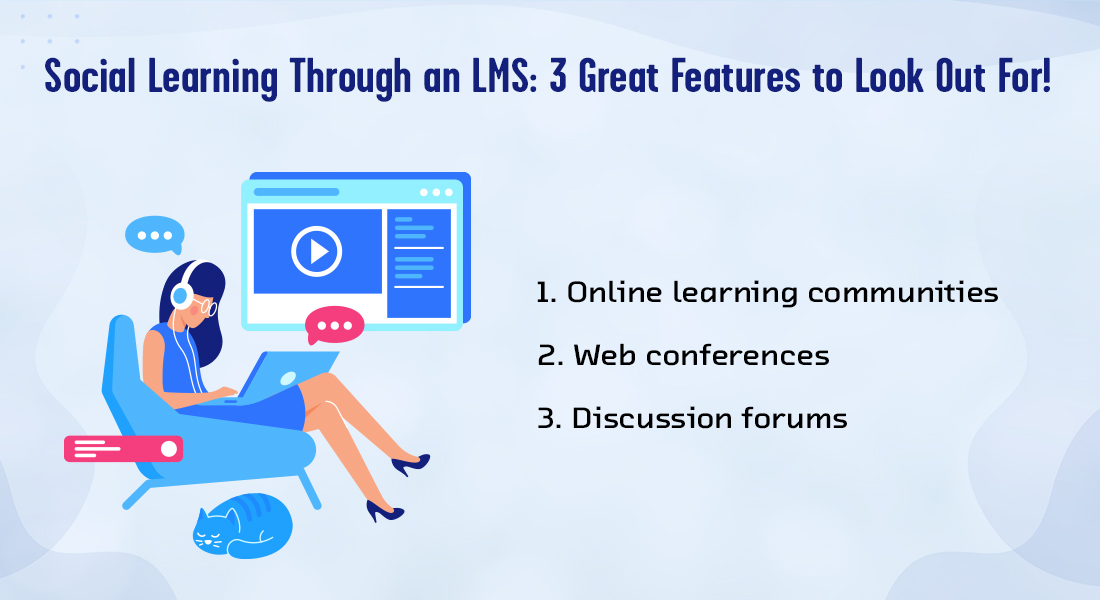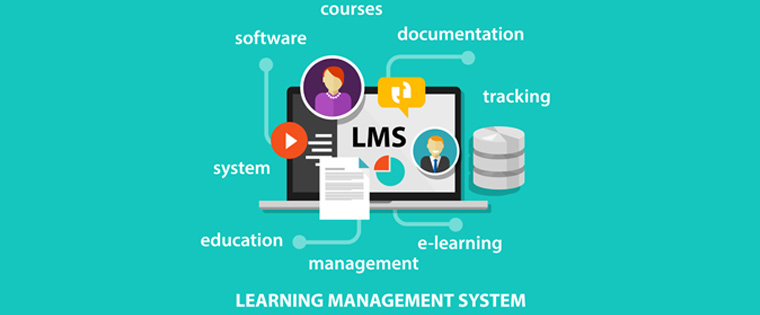Social Learning through the LMS: 3 Features that Make it Possible!

Working remotely does have its perks. However, there are a few drawbacks of remote working that make life hard for both the employees as well as the organization. COVID-19 has led to ‘mass loneliness’ (how ironic!); the whole world is experiencing bouts of panic and anxiety due to social distancing and isolation. In this situation, remote work is not as easy as it sounds. And training the remote worker? It’s a difficult task. But there is a solution – social learning!
How Does the LMS Facilitate Social Learning?
By enabling:
- Online learning communities
- Web conferences
- Discussion forums
Social learning is a term that comes from Albert Bandura’s Social Learning Theory. It is, in simple words, learning that is done through observation, imitation, and modeling. Organizations across the world are now looking for remote friendly workplaces and online learning communities that can help reduce this mass loneliness felt by most remote workers today.
The good news is that the world is shrinking, thanks to the power of technology. And that can help bridge the gap between the organization and its isolated workers. This is where Learning Management Systems (LMSs) come into play. A Learning Management System is a software application that enables training managers to administer, track, and report training. Over the years, LMSs have evolved to include a variety of useful features, which include social learning features as well! Let’s take a look at 3 of the best social learning features of the LMS:
Curious about the New-Age LMS? Explore our webinar here!
Social Learning During the Times of Corona: The LMS to the Rescue!
1. Online Learning Communities
One of the most important social learning features of modern day LMSs is the online learning communities that create a network of learners who can connect with one another based on shared interests. Online learning communities will allow you to learn with and from your peers. Modern LMSs have inbuilt tools that allow learners to share information in the form of resources, glossaries, notes, videos, PPTs, etc. Mobile friendly LMSs have an added advantage in that they give you the option of accessing everything you need on the phone.
2. Web Conferences
The isolation during ‘work from home’ can reduce productivity and lead to a lot of negative impact, especially when you are cooped up in a room with just your computer screen and no human, face-to-face interaction. This can be avoided by using the web conferencing features of the LMS to encourage learners (especially freshers) to get to know their colleagues, even though they are miles apart. Web conferencing (you can also have a video web conference for maximum face-to-face interaction) can provide an emotional boost (a reminder that you have others working with you as well) and plays the role of a support system at the virtual workplace; getting to know one’s colleagues while working and learning with them is very important to ensure that you feel comfortable and not too isolated. It is true that nothing can replace in-person contact, but web conferencing can help accomplish tasks quickly since you will also be able to see the learners’ expression and level of interest/engagement.
3. Discussion Forums
Online discussion forums are platforms that allow learners from different locations to gather and have discussions on topics that are relevant to them. Discussion forums create scope for informal discussions as well – that will help employees bond with one another, relate to each other better, and understand how well they can work together, as a team. They can debate, brainstorm, and come up with ideas that will stimulate their intellects in the long run. LMS discussion forums include search tools, topics, threads, etc. They also allow people to add topics, start group discussions, create polls, and so on.
Wait a minute! You must be wondering why an LMS is required to perform these activities when they can be done on other apps. Here’s why:
Why an LMS for Social Learning?
Learning Management Systems make the process of social learning much simpler. Without the common platform that an LMS provides, it becomes difficult to bring together a large group of people, whether it is for a meeting, training, or another group activity. The in-built tools of the LMS makes it easy for users to upload, download, and save files without the fear of losing them; they can be stored directly on the LMS platform.
Some LMSs also have features that help learners access information offline as well. This is very useful for remote workers who travel often, or go for field work. Since it runs on a common platform, the LMS also allows users to edit, update, and review documents; for example, users can leave comments that can be viewed by other users who have access to that particular document. Therefore, the general process of review becomes much shorter, quicker, and more efficient (sending multiple emails, rewriting, reworking etc., can all be avoided with an LMS in place).
Summing It Up!
Social Learning is a very important aspect of our lives. We learn as we grow, by watching people around us, listening to their language, noticing their gestures and expressions, and understanding the meaning they are trying to convey. This is applicable to work life as well. Connecting with colleagues, especially during COVID-19, is important for the employees’ mental health and, in the long run, it will produce better results. An LMS, with its social learning functions, can make life much simpler for organizations. So, go ahead and invest in a good LMS for some great results!
Want to know more about how an LMS works? Take a look at our Beginner’s Guide to Learning Management Systems.





